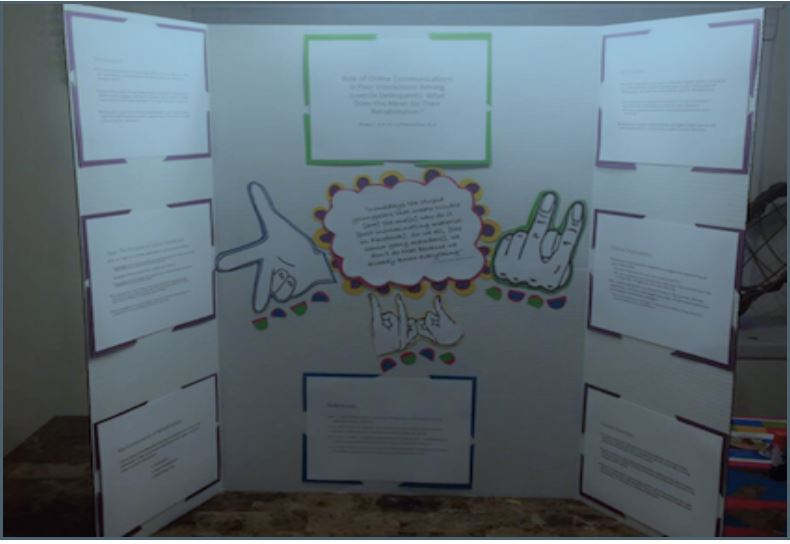 Meagan E. Scott is a first year doctoral student at Florida School of Professional Psychology at Argosy University Tampa. She presented this poster: Role of Online Communications in Peer Interactions Among Juvenile Delinquents: What Does this Mean for Their Rehabilitation? Congratulations on your presentation, Meagan! Abstract: As the prevalence of social media continues to rapidly grow in our society, research should examine how this influence could be affecting the rehabilitation of juveniles and youths-at risk. The poster presented aimed to explore the potential of this influence, as well as the management of peer-to-peer interactions via online communications. Research suggests that juveniles are utilizing social media platforms as a means of having and saving “face”. This idea of “face” proves to be essential in prompting gang activity and facilitating online peer interactions (Lim, Chan, & Basnyat, 2012). As peer interactions continue to primarily happen online, it is crucial that clinicians have a deeper understanding of the role online communication plays in peer relationships, as well as examining if correspondences on popular online platforms (i.e.: Facebook) could be used to aid or inhibit rehabilitation for juvenile delinquents. Future implications could allow clinicians to incorporate online interactions in a meaningful way without compromising recovery. In addition, by better understanding the role online communications play in peer interactions, clinicians may be able to target at-risk-youth and minimize their exposure to negative stimuli, possibly resulting in fewer criminal cases and increased well-being. As the reliance of the internet continues to grow, this poster analyzed the mentioned goals, ultimately supporting the idea that online interventions could be used as a useful tactic for client growth and rehabilitation.
0 Comments
 Brittany Penson Brittany Penson Brittany Penson is a 4th year student in the Clinical Psychology Doctoral Program at Texas A&M University. Her paper, Using the Personality Assessment Inventory Antisocial and Borderline Features Scales to Predict Behavior Change: A Multisite Longitudinal Study of Youthful Offenders, was recently accepted to Assessment. Congratulations, Brittany! Thank you for sharing your accomplishment with us. Abstract: A substantial amount of research has examined the developmental trajectory of antisocial behavior and, in particular, the relationship between antisocial behavior and maladaptive personality traits. However, research typically has not controlled for previous behavior (e.g., past violence) when examining the utility of personality measures, such as self- report scales of antisocial and borderline traits, in predicting future behavior (e.g., subsequent violence). Examination of the potential interactive effects of measures of both antisocial and borderline traits also is relatively rare in longitudinal research predicting adverse outcomes. The current study utilizes a large sample of youthful offenders (N = 1,354) from the Pathways to Desistance project to examine the separate effects of the Personality Assessment Inventory Antisocial Features (ANT) and Borderline Features (BOR) scales in predicting future offending behavior as well as trends in other negative outcomes (e.g., substance abuse, violence, employment difficulties) over a 1-year follow-up period. In addition, an ANT × BOR interaction term was created to explore the predictive effects of secondary psychopathy. ANT and BOR both explained unique variance in the prediction of various negative outcomes even after controlling for past indicators of those same behaviors during the preceding year.
The AP-LS Student Committee is pleased to announce a joint initiative with the Minority Affairs Committee intended to increase the visibility of undergraduate and graduate minority students who have contributed to the intersection of psychology and law.
We are continuously seeking submissions from minority student affiliates of AP-LS with recent contributions to the field, including conference presentations, publications, facilitation of workshops or seminars, or similar achievements. Please visit http://www.apls-students.org/minority-student-initiative.html for the call for submissions. |
About the Editor:
The American Psychology-Law Society (Division 41 of the American Psychology Association) Student Committee is composed of elected student leaders representing the interests of our student members. Categories
All
Archives
June 2024
|
|
Except where otherwise noted, content on this site is licensed under a Creative Commons Attribution 4.0 International license. Icons by Icons8
|
|

 RSS Feed
RSS Feed
